#globalhealthcare
Text
Vinayaka Mission’s Law School (VMLS) – Pioneering Legal Education in Chennai
Vinayaka Mission’s Law School (VMLS), a constituent college of Vinayaka Mission’s Research Foundation (Deemed to be University), is reshaping legal education in Chennai. Mentored by Jindal Global Law School, the top-ranked law school in India according to the QS World University Rankings 2024, VMLS is pioneering a new approach to legal education. Its vision is centered on creating access to justice for all, by offering a high standard of lawyering, integrating cutting-edge technology, and addressing emerging global challenges.
A Global Vision with Local Impact
VMLS envisions leading the fourth wave of Indian legal education, focusing on inclusivity, excellence, and access to justice. It aims to create a balance between local needs and global standards by adapting its curriculum to suit both Tamil and English-speaking students, making law more accessible for everyone. This is critical for the future of legal education in India, where many learners face language barriers.
The law school also addresses the ever-evolving legal landscape, ensuring that its students are well-equipped to tackle global legal issues such as climate change, sustainability, and advancements in artificial intelligence (AI) and machine learning (ML).
Unique Bilingual Education and Student-Centric Pedagogy
VMLS is one of the top law colleges in Chennai that offers a bilingual education model designed to make legal materials accessible to students in both English and Tamil. This approach creates an inclusive classroom environment where faculty and students work together to bridge the gap between these two languages. Students participate in various activities, including trial moot court competitions and policy debates, enhancing their comprehension and practical skills.
By offering course materials in Tamil and focusing on student-centric learning, VMLS ensures that students from diverse backgrounds can thrive, laying the foundation for future legal professionals capable of serving a multilingual society.
Integrating Technology for the Future
As technology reshapes industries worldwide, the legal profession is no exception. VMLS is committed to staying at the forefront by integrating technology into its curriculum. From cybersecurity and data protection to paperless courts and virtual hearings, VMLS prepares students for the future of law.
Through their Centre for Justice through Technology, inaugurated by Hon’ble Justice (retd.) Dr. S. Muralidhar, VMLS equips students with the skills needed to navigate an increasingly digital legal landscape. This center also plays a critical role in fostering technological literacy among students, helping them become adept at using modern tools in courtrooms, arbitration settings, and other legal forums.
Commitment to Sustainability and Diversity
VMLS is also leading the way in creating a legal curriculum that tackles the pressing challenges of climate change. Their innovative approach includes rethinking traditional environmental law courses to incorporate comparative, multidisciplinary, and public policy insights, empowering students to understand the critical role of law in addressing climate change and sustainability.
The law school’s commitment to diversity is reflected in its emphasis on employment law through the lens of inclusivity and equality in the workplace. This forward-thinking approach ensures that students graduate with a well-rounded understanding of how law and policy must evolve to meet societal changes.
Skills for the 21st Century Lawyer
One of the key focuses of VMLS is skill-building, which extends beyond theoretical knowledge to practical legal skills, particularly trial advocacy. This training is crucial for aspiring lawyers who wish to serve the public at both the local and global levels. Through its Centre for Global Tamil Law and Communications and English Language Lab, VMLS fosters language proficiency, critical thinking, and digital skills among its students.
In addition, students are exposed to leadership training, collaborative learning, and problem-based evaluation to ensure they are fully prepared for the demands of the modern legal profession.
World-Class Faculty and Research Opportunities
VMLS is home to a highly qualified faculty, many of whom hold foreign qualifications from prestigious universities like Stanford, UPenn, Oxford, and Melbourne. These experts create a progressive learning environment and mentor students in both Bar Council of India-prescribed courses and innovative electives addressing dynamic legal issues.
Faculty members are also actively engaged in research, giving students the opportunity to collaborate on projects, fine-tune their research skills, and contribute to publications in national and international law reviews.
Why Choose Vinayaka Mission’s Law School?
If you’re looking to pursue a legal education that blends traditional knowledge with future-ready skills, VMLS is one of the best law colleges in Chennai. With a forward-looking curriculum, bilingual education, and a strong emphasis on technology and sustainability, VMLS is uniquely positioned to equip students with the tools they need to succeed in the 21st century.
By choosing VMLS, you are not only enrolling in one of the top law colleges in Chennai but also becoming part of a global network, thanks to the mentorship of Jindal Global Law School and OP Jindal Global University. This partnership ensures that VMLS remains at the cutting edge of legal education in India and beyond.
Explore more about the opportunities that await you at Vinayaka Mission University, Chennai and embark on a journey to shape the future of law in India and across the globe.
#MedicalTourism#AffordableHealthcare#IndiaMedicalTourism#MeddiTour#GlobalHealthCare#AffordableTreatment#MedicalTravel#HealthBeyondBorders#IndiaHospitals#MedicalTourismPackages
0 notes
Text
The Impact of Regulatory Changes on Global Pharmaceuticals

Introduction
In the rapidly evolving global pharmaceutical industry, regulatory changes play a pivotal role in shaping the landscape of drug development, manufacturing, and market access. These changes are influenced by evolving healthcare needs, safety concerns, and technological advancements, affecting stakeholders across the industry. As regulations shift, they impact every aspect of pharmaceutical operations, from drug design to market strategies. This blog explores the multifaceted effects of regulatory changes on global pharmaceuticals and offers insights into how industry players can navigate these challenges.
Impact on Drug Development
Regulatory changes significantly influence the entire life cycle of drug development. Stricter guidelines can lengthen approval pathways, demanding extensive clinical trials and rigorous safety studies. This often results in increased costs and delays in bringing new drugs to market. For instance, new regulations might require additional testing phases or more comprehensive data on long-term safety, impacting the time and financial resources needed for drug development.
Conversely, streamlined legislation can facilitate faster approvals, promoting innovation and expediting the availability of new treatments. For example, regulatory bodies may introduce fast-track programs for breakthrough therapies, allowing companies to bring innovative drugs to market more quickly. This balance between stringent requirements and accelerated processes is crucial for maintaining both safety and efficiency in drug development.
#DrugDevelopment #PharmaceuticalRegulations #ClinicalTrials
Manufacturing Standards and Compliance
Pharmaceutical companies must adhere to regulatory frameworks across different markets, each with its own set of quality standards, supply chain requirements, and environmental sustainability guidelines. Changes in these regulations compel companies to adapt rapidly to ensure compliance and maintain market access.
For example, new regulations may impose stricter quality control measures or mandate increased transparency in the supply chain. Companies that adapt to these changes not only secure regulatory approval but also build consumer and regulatory confidence. In some cases, enhanced standards can serve as a competitive advantage by demonstrating a commitment to high-quality products and responsible practices.
#ManufacturingStandards #RegulatoryCompliance #SupplyChainTransparency
Market Access and Pricing Strategies
Regulatory changes also impact market access and pricing strategies. Strict approval requirements in certain markets can limit the availability of new drugs, necessitating strategic planning to navigate these barriers. Companies must carefully assess regulatory requirements and adjust their market entry strategies accordingly.
Pricing regulations aimed at controlling healthcare costs can affect profitability and market competition. As governments and insurance companies implement price controls or reimbursement limits, pharmaceutical firms may need to adopt flexible pricing policies and value-based approaches to ensure their products remain accessible while maintaining financial viability.
#MarketAccess #PricingStrategies #HealthcareRegulations
Technological Innovation and Regulatory Adaptation
Technological advancements, such as artificial intelligence (AI) and biotechnology, are driving significant changes in the pharmaceutical industry. These innovations often prompt regulatory bodies to update their frameworks to ensure they align with new technologies while maintaining safety and ethical standards.
For instance, AI-driven drug discovery and personalized medicine require new regulatory approaches to address the unique challenges they present. Collaboration between industry leaders and regulators is essential to ensure that technological advancements are effectively integrated into the regulatory framework, fostering innovation while safeguarding public health.
#TechnologicalInnovation #AIinPharma #Biotechnology
Global Harmonization Efforts
Efforts to harmonize global regulations aim to simplify procedures and reduce barriers in international markets. Initiatives such as the International Council for Harmonization (ICH) work to align technical requirements and increase efficiency in pharmaceutical and cross-border approvals.
Despite these efforts, challenges remain in reconciling diverse regulatory priorities across different regions. Balancing global harmonization with local healthcare needs requires ongoing dialogue and collaboration among international stakeholders to address varying regulatory landscapes and healthcare priorities.
#GlobalHarmonization #ICH #PharmaceuticalRegulations
Strategic Responses and Industry Trends
To navigate the complex regulatory environment, pharmaceutical companies must adopt strategic responses and stay abreast of industry trends. This includes proactive engagement with regulatory bodies, investing in compliance infrastructure, and leveraging technological advancements to streamline processes.
Companies that successfully navigate regulatory changes can gain a competitive edge by accelerating drug development, ensuring compliance, and adapting pricing strategies to meet evolving market demands. The ability to remain flexible and forward-thinking in response to regulatory shifts is crucial for long-term success in the global pharmaceutical industry.
#StrategicResponses #PharmaTrends #RegulatoryAdaptation
Conclusion
The impact of regulatory reform on global pharmaceuticals is profound and multifaceted, influencing product innovation, market development, and patient access to treatments. As regulatory environments continue to evolve, industry players must remain agile and forward-thinking to capitalize on emerging opportunities and mitigate risks. By staying informed and adaptable, pharmaceutical companies can successfully navigate the complexities of regulatory changes and contribute to advancing global healthcare.
#PharmaceuticalIndustry #RegulatoryImpact #DrugInnovation
FAQ
Q1: How do regulatory changes affect the drug development timeline?
A1: Regulatory changes can either lengthen or shorten the drug development timeline. Stricter guidelines may necessitate additional clinical trials and safety studies, causing delays. Conversely, streamlined regulations can expedite approval processes and bring new drugs to market faster.
Q2: What are the main challenges in complying with global manufacturing standards?
A2: Key challenges include adapting to varying quality standards across different markets, ensuring supply chain transparency, and meeting environmental sustainability requirements. Compliance with these standards is crucial for market access and building trust with consumers and regulators.
Q3: How do pricing regulations impact pharmaceutical companies?
A3: Pricing regulations can affect profitability and market competition. Companies may need to adjust their pricing strategies to remain competitive while adhering to price controls or reimbursement limits imposed by governments and insurance companies.
Q4: What role does technology play in regulatory adaptation?
A4: Technology, such as AI and biotechnology, drives regulatory updates to address new challenges and opportunities. Collaboration between industry and regulators is essential to integrate technological advancements while ensuring safety and ethical standards.
Q5: What are the benefits of global regulatory harmonization?
A5: Global regulatory harmonization simplifies procedures, reduces barriers, and increases efficiency in international markets. Initiatives like the ICH work to align technical requirements and streamline cross-border approvals, although challenges in balancing diverse healthcare priorities remain.
BKM Health, your trusted partner offering comprehensive solutions to a wide range of medical challenges. From navigating regulatory landscapes to optimizing medical billing services and addressing manufacturing needs.
BKM Health is your one-stop destination. Specializing in Global Pharmaceuticals, Regulatory Affairs, Nutraceuticals & Pharmaceuticals Manufacturing, Private Labeling, Product Packaging, Storage Services, Medical Billing, and Wholesale distribution in the US & Canoe to ada market, we are committed to delivering tailored and effective solutions that drive success in healthcare. Join us as we redefine possibilities in medical solutions with BKM Health.
#PharmaceuticalRegulation#DrugDevelopment#GlobalHealthcare#PharmaIndustry#RegulatoryChanges#HealthPolicy
0 notes
Text
Discover how M Care Exports is revolutionizing pharmaceutical logistics in 2024 with cutting-edge technology. Learn about their innovative solutions for streamlined medicine export, ensuring safety, efficiency, and global reach in the pharmaceutical supply chain.
To know more about the M-care exports then read the full blog by clicking above:
#pharmaceutical#pharmacompany#pharmaceuticalindustry#pharmaindustry#exportersindia#healthcare#pharma#exportingexcellence#globalhealthcare#healthcareexcellence
0 notes
Text

MyHospitalNow: Your Gateway to World-Class Healthcare and Expert Medical Services
At MyHospitalNow, we connect you with top hospitals and doctors worldwide, ensuring expert care is always at your fingertips. Our personalized matching service identifies the best healthcare providers based on your unique needs, offering you peace of mind and access to world-class medical care.
#MyHospitalNow#HospitalSelection#DoctorSelection#MedicalTourism#GlobalHealthcare#ExpertCare#PatientCare#TopDoctors#BestHospitals#HealthcareJourney#HealthAndWellness#MedicalTravel#VirtualHealthcare#AffordableCare#PatientCentric
0 notes
Text
MBBS from Georgia

Top Reasons to Choose MBBS in Georgia
Georgia has emerged as a prime destination for Indian students pursuing MBBS due to its outstanding medical education, cutting-edge healthcare facilities, and affordable costs. This European country offers a compelling blend of quality education and cost-effectiveness, making it an attractive option for those seeking to study medicine abroad.
Leading Medical Universities in Georgia
Georgia is home to several esteemed medical universities, including:
Tbilisi: Features three top-tier medical schools renowned for their quality education and research.
Batumi: Hosts a prominent medical institution known for its modern facilities.
Kutaisi: Offers a reputable medical program with a focus on clinical excellence.
These universities are accredited by major global bodies such as NMC, WHO, WFME, ECFMG, and FAIMER, ensuring that the degrees are recognized internationally.
Affordable Education and Living Costs
Studying MBBS in Georgia is significantly more cost-effective compared to India, with annual tuition fees ranging from 3 to 8 lakhs (4,000 to 8,000 USD). Additionally, Georgia stands out as one of the most economical European countries, providing a high standard of living, including affordable food, lodging, and travel. It is also celebrated as the 7th safest country in the world, offering a secure environment for international students.
Benefits of Studying MBBS in Georgia
High Employability: Graduates enjoy strong job prospects globally due to the high standard of education.
Advanced Healthcare Facilities: Students gain hands-on experience in state-of-the-art medical facilities.
Safety and Quality of Life: With a low student-to-teacher ratio of 12:1, Georgia offers a safe, supportive environment and a great quality of life.
Cultural Experience: Students experience a rich cultural heritage and vibrant lifestyle while studying.
Comprehensive Support for Prospective Students
If you’re considering MBBS in Georgia, we provide detailed guidance on application processes, visa requirements, and university selection to ensure a smooth transition.
Explore the opportunity to build a successful career in healthcare with world-class education in Georgia. Contact us for more information and personalized assistance with your MBBS journey.
#MBBSinGeorgia#StudyMedicineAbroad#MedicalEducation#MBBSJourney#GeorgianUniversities#InternationalStudents#MedicalSchool#AffordableEducation#GlobalHealthcare#StudentLife
0 notes
Text
Best Neurology treatment in India at affordable prices

Seeking the best neurology treatment in India at affordable prices? Look no further than Medserg! 🧠 Connect with top doctors and leading hospitals for specialized care without personal charges. Here's why you should choose us:
Affordable Healthcare: Access world-class neurology treatment in India without breaking the bank.
Top Doctors: Collaborate with renowned neurologists known for their expertise and compassionate care.
State-of-the-Art Facilities: Benefit from advanced medical technologies for accurate diagnosis and treatment.
Personalized Care: We prioritize your well-being with comprehensive support throughout your medical journey.
Global Reputation: Trusted by patients worldwide for quality healthcare solutions.
Transparent Pricing: No hidden fees — we ensure transparency in all aspects of your treatment.
Accessible Services: Hassle-free assistance with travel, accommodation, and language support.
Patient-Centered Approach: Your health and comfort are our top priorities.
Proven Success: See real results with our effective treatment plans.
Empowering Healthcare Choices: Take control of your health with Medserg.
Discover how we can transform your neurology treatment experience. Visit Medserg today to learn more!
#NeurologyTreatment#MedicalTourismIndia#TopDoctors#AffordableHealthcare#MedsergCare#HealthcareExcellence#PatientCare#GlobalHealthcare#NeurologyIndia#HealthcareAccessibility
0 notes
Text

𝐄𝐱𝐩𝐥𝐨𝐫𝐢𝐧𝐠 𝐆𝐫𝐨𝐰𝐭𝐡 𝐎𝐩𝐩𝐨𝐫𝐭𝐮𝐧𝐢𝐭𝐢𝐞𝐬 𝐢𝐧 𝐭𝐡𝐞 𝐇𝐞𝐦𝐨𝐝𝐢𝐚𝐥𝐲𝐬𝐢𝐬 𝐌𝐚𝐫𝐤𝐞𝐭
𝐒𝐞𝐜𝐮𝐫𝐞 𝐚 𝐅𝐑𝐄𝐄 𝐒𝐚𝐦𝐩𝐥𝐞: https://www.nextmsc.com/hemodialysis-market/request-sample
As the healthcare landscape evolves, so does the demand for advanced renal care solutions. The global hemodialysis market continues to expand, driven by technological advancements, rising prevalence of renal disorders, and increasing healthcare expenditure worldwide.
𝐊𝐞𝐲 𝐌𝐚𝐫𝐤𝐞𝐭 𝐈𝐧𝐬𝐢𝐠𝐡𝐭𝐬:
𝐌𝐚𝐫𝐤𝐞𝐭 𝐆𝐫𝐨𝐰𝐭𝐡: The hemodialysis market is projected to grow significantly in the coming years, fueled by innovations in dialysis machines, vascular access products, and dialyzers.
𝐓𝐞𝐜𝐡𝐧𝐨𝐥𝐨𝐠𝐢𝐜𝐚𝐥 𝐀𝐝𝐯𝐚𝐧𝐜𝐞𝐦𝐞𝐧𝐭𝐬: Advances such as portable dialysis machines and wearable artificial kidneys are revolutionizing patient care, enhancing mobility and quality of life.
𝐆𝐥𝐨𝐛𝐚𝐥 𝐈𝐦𝐩𝐚𝐜𝐭: With a growing aging population and increasing incidence of chronic kidney diseases (CKD), especially in emerging economies, the demand for hemodialysis products and services is on the rise.
𝐌𝐚𝐫𝐤𝐞𝐭 𝐃𝐲𝐧𝐚𝐦𝐢𝐜𝐬:
𝐊𝐞𝐲 𝐂𝐨𝐦𝐩𝐚𝐧𝐢𝐞𝐬: Leading companies are focusing on R&D to introduce next-gen dialysis solutions, improving treatment efficiency and patient outcomes.
𝐏𝐚𝐭𝐢𝐞𝐧𝐭-𝐂𝐞𝐧𝐭𝐫𝐢𝐜 𝐂𝐚𝐫𝐞: Emphasis on personalized therapies and home-based dialysis options is reshaping the market dynamics, offering greater convenience and comfort to patients.
𝐀𝐜𝐜𝐞𝐬𝐬 𝐅𝐮𝐥𝐥 𝐑𝐞𝐩𝐨𝐫𝐭: https://www.nextmsc.com/report/hemodialysis-market
𝐊𝐞𝐲 𝐏𝐥𝐚𝐲𝐞𝐫𝐬:
Comprehensive competitive analysis and profiles of the major market players such as Asahi Kasei Corporation, Cantel Medical Corp., DaVita, Inc., Diaverum, Fresenius Medical Care AG & Co. KGaA, Nikkiso Co., Ltd., B. Braun Melsungen AG, Baxter International, Inc., Nipro Corporation, NxStage Medical, Inc., and others are provided in the hemodialysis industry report.
𝐋𝐨𝐨𝐤𝐢𝐧𝐠 𝐀𝐡𝐞𝐚𝐝: The future of hemodialysis lies in collaborative innovation and sustainable healthcare practices. As stakeholders, let's continue to drive advancements that redefine renal care and improve lives globally.
#hemodialysis#healthcareinnovation#medicaldevices#renalcare#globalhealthcare#medical#innovation#marketresearch#markettrends#businessinsights
0 notes
Text
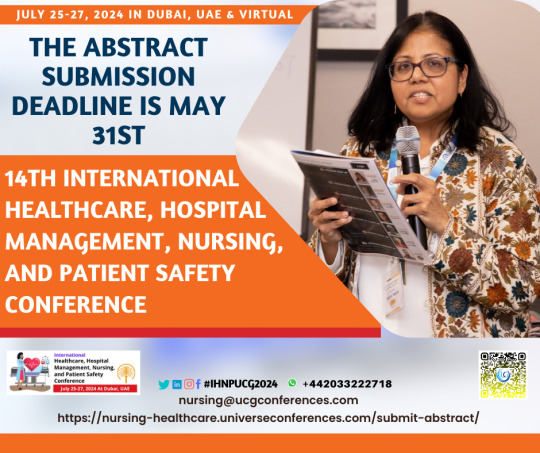
You have the chance to speak here. From July 25–27, 2024, in Dubai, UAE, and Virtually, present your abstract, research, or poster at the 14th International Healthcare, Hospital Management, Nursing, and Patient Safety Conference, which is CME/CPD recognised.
WhatsApp: https://wa.me/442033222718
Submit your abstract here: https://nursing-healthcare.universeconferences.com/submit-abstract/
#Patientsafety#OncologyNursing#CardiacNursing#GynacologyandObstetricsNursing#Nursing#GlobalHealthcare#HealthcareManagement#HealthEconomics#PrecisionMedicine
0 notes
Text
#AIMSpecialtyHealth#HealthcareManagement#PatientCare#EvidenceBasedMedicine#RadiologyManagement#CardiologyCare#OncologyManagement#MusculoskeletalHealth#SpecialtyDrugs#HealthTech#DigitalHealth#HealthcareInnovation#PatientOutcomes#CostReduction#UtilizationManagement#ClinicalGuidelines#HealthData#EHRIntegration#HealthAnalytics#AdvancedDecisionSupport#HealthcareQuality#MedicalTechnology#HealthPolicy#PatientEngagement#ProviderSatisfaction#HealthcareCompliance#HealthcareResearch#FutureOfHealthcare#GlobalHealthcare#HealthSavings
0 notes
Text
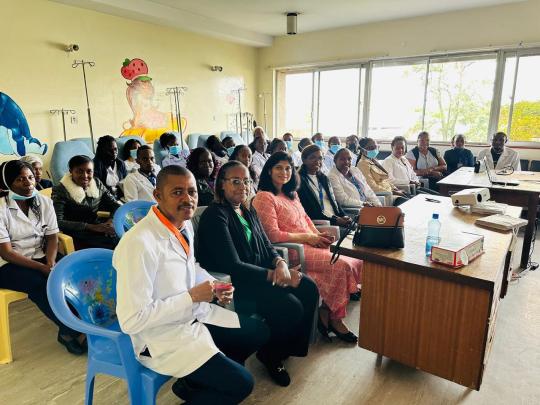
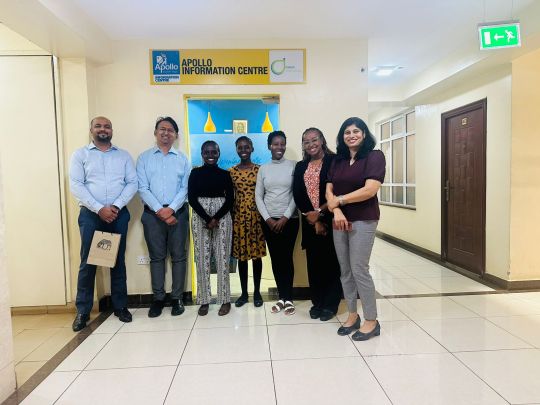
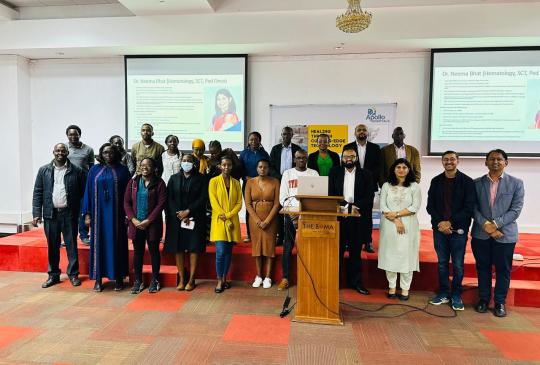
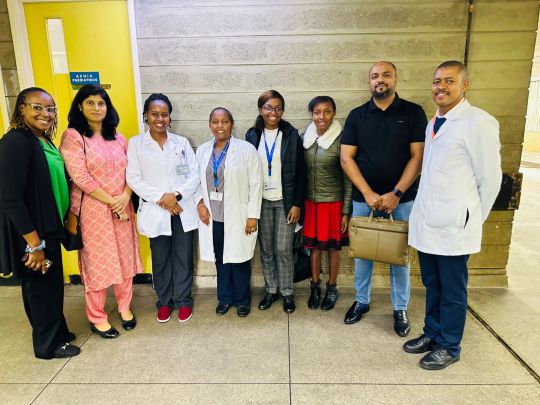
Thrilled to have Dr. Neema Bhat from Apollo Hospitals Bangalore grace us with her expertise at the Apollo Hospitals Information Centre in Nairobi, Kenya! With her specialization in Hematology, Stem Cell Transplantation, and Pediatric Oncology, we're set to advance healthcare together.
For appointments,
📞 WhatsApp: +254-719581035 / +254-789-150890 / +254-748-830976
✉ [email protected]
🌎 www.apolloinformationcentre.com
#MedicalExcellence#GlobalHealthcare#KenyaHealthcare#HealthcareInnovation#GlobalMedicine#CollaborativeHealthcare#ExpertConsultation#SpecializedCare#HealthcareLeadership#MedicalAdvancements#CancerCare#BloodDisorders#BoneMarrowTransplant#PediatricHealth#HealthcarePartnerships#InternationalMedicine#MedicalSpecialists#ApolloHospitals#NairobiHealthcare#BangaloreMedicine#HealthcareNetworking#HealthcareCommunity#EmpoweringPatients
0 notes
Text
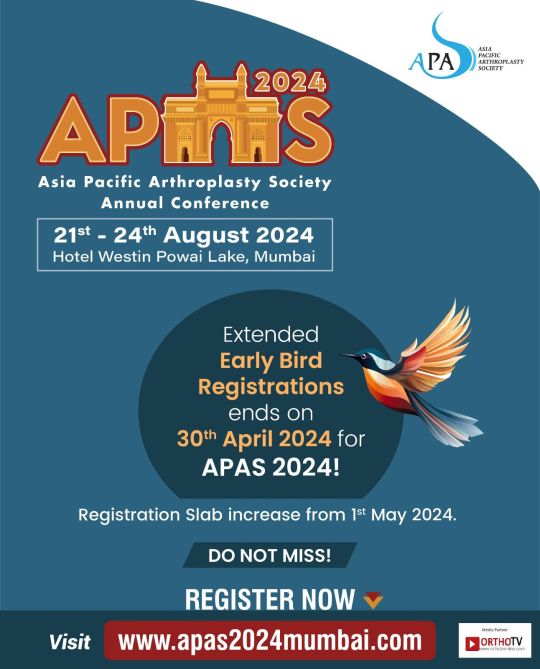
🔰ASIA PACIFIC ARTHROPLASTY SOCIETY
🗓️ DATE : 21st - 24th AUGUST 2024
🏨 VENUE : WESTIN POWAI LAKE, MUMBAI
▶️ Click here to register :
https://tinyurl.com/OrthoTV-APAS-2024
🔺 Early Bird Registrations Closes Today
👨⚕️ ORGANISING COMMITTEE
Dr Bharat Mody : Organising Chairman
Dr Rajkumar Natesan : Organising Secretary
Dr Kshitij Mody : Organising Secretary Chairman
Dr Rami Sorial : Scientific Committee
👨⚕️ ADVISORY MEMBERS
NATIONAL : Dr Parag Sancheti ,
Dr. Rajeev Sharma , Dr Abhay Elhence , Dr Kunal Aneja
INTERNATIONAL:
Dr Gabriel Baron - Chile 🇨🇱
Dr Kukuh Dwiputra - Indonesia🇮🇩
Dr David Choon - Malaysia 🇲🇾
Dr Simon Coffey - Australia 🇦🇺
Dr Azeta Arif - International Advisor
🤝 Media Partner : OrthoTV Global
#APAS2024#ArthroplastyConference#OrthopedicsEvent#MumbaiMedicalConference#JointReplacement#OrthoTVGlobal#MedicalEducation#SurgicalInnovation#OrthopedicSurgeons#GlobalHealthcare
1 note
·
View note
Text
The Indian Pharmaceutical Industry: A Key Player in Global Healthcare

The Indian pharmaceutical industry is crucial to healthcare around the world. It produces a wide range of medicines that are used to treat various health conditions. India's role in global healthcare is significant due to several key factors:
Large-Scale Production: India is known for its high-volume production of medicines. It supplies affordable and high-quality drugs to many countries, especially those in need of essential medications.
Innovation and Research: Indian pharmaceutical companies invest in research and development to create new and effective treatments. This innovation helps in fighting diseases and improving health outcomes globally.
Affordable Medicines: Indian drugs are often more affordable compared to those from other countries. This cost-effectiveness helps many people around the world access necessary treatments.
Global Presence: Indian pharmaceutical companies export their products to over 200 countries. They play a crucial role in ensuring that people everywhere can get the medications they need.
Support During Health Crises: The industry has shown its importance during global health emergencies, such as the COVID-19 pandemic, by rapidly producing and supplying vaccines and treatments.
Overall, the Mcare exporter is the leading pharmaceutical industry is a vital part of the global healthcare system. Its contributions help improve health and save lives across the world.
#PharmaceuticalIndustry#GlobalHealthcare#IndianPharmaceuticals#Medicine#HealthcareInnovation#AffordableDrugs#HealthCrisisSupport#DrugExport#Healthcare
0 notes
Text
youtube
Patient Testimonials
John from Zambia (africa) shares his inspiring journey: Discover how CyberKnife transformed his battle against cancer. Join the ranks of those empowered by cutting-edge technology in the fight for health and hope.
Make an appointment - +91-9811196301
0 notes
Text
A World of Opportunity: Advantages of Pursuing MBBS Studies in Abroad

Studying MBBS abroad offers a remarkable chance for cultural immersion. Embracing a new culture involves actively engaging with local communities, participating in cultural events, joining student clubs or organizations, and fostering connections with both international and local peers. By immersing yourself in the local culture, you not only enrich your educational experience but also develop valuable cross-cultural skills that can benefit you personally and professionally.
Studying MBBS in abroad can open up many exciting opportunities. Here are some reasons why:
Explore New Cultures: When you study abroad, you get to experience different cultures and ways of life. This can be really interesting and help you grow as a person.
Learn from the Best: Many countries have top-notch medical schools with excellent teachers and facilities. Studying in one of these schools can give you a high-quality education.
Advance Your Career: Completing your MBBS abroad can give you more career options. You might be able to work in different countries or get specialized training in a field you're interested in.
Make Lifelong Connections: Studying abroad lets you meet people from all over the world. These friendships can last a lifetime and open doors to future opportunities.
Develop Language Skills: If you study in a country where English isn't the main language, you can improve your language skills. This can be helpful in your personal and professional life.
Affordability: In some cases, studying MBBS abroad can be more affordable than in your home country. There might be scholarships or lower tuition fees available for international students.
Experience Advanced Technology: Some countries are leaders in medical research and technology. By studying there, you can learn about the latest advancements in medicine.
Gain Independence: Living in a foreign country teaches you to be independent and adaptable. These are valuable skills that will serve you well in your future career.
#MBBSAbroad#InternationalMedicine#GlobalMedEd#MedicalEducationAbroad#StudyMedicineOverseas#MedSchoolAbroad#GlobalHealthcare#CulturalImmersion#MedStudentLife#DiversityInMedicine
1 note
·
View note
Text
Destination Healing: Embarking on a Medical Tourism Journey
Introduction to Medical Tourism
Medical tourism refers to the practice of traveling abroad to obtain medical, dental and surgical care. The key factors driving the growth of medical tourism include affordability, accessibility, and availability of quality treatment options. More and more people are choosing to travel to other countries for obtaining healthcare services.
Popular Destinations for Medical Tourism
Thailand:
Thailand has emerged as one of the top medical tourism destinations in Asia. It offers world-class healthcare facilities at substantially lower costs compared to other developed countries. Joint replacement surgeries, dental care and cosmetic procedures are some of the most commonly sought after treatments by medical tourists in Thailand. The country is also promoting medical tourism as a way to boost its economy.
India:
India's private healthcare sector has witnessed exponential growth over the past decade. Several Joint Commission International (JCI) accredited private hospitals in cities like Delhi, Mumbai and Chennai offer high-quality yet affordable treatment packages. Cardiac surgery, orthopedic surgeries and oncology are among the leading areas attracting medical tourists to India from countries like the United States, United Kingdom and Middle East.
Malaysia:
Malaysia is investing heavily in the healthcare and biomedical industry to increase its share in the global medical tourism pie. The sector is steered by organizations like the Malaysia Healthcare Travel Council (MHTC). Facilities like the KPJ Healthcare Berhad chain of private hospitals provide world-class patient care matching global standards of developed countries. Cosmetic, fertility and dental tourism are particularly popular segments.
Cost Savings with Medical Tourism
One of the primary factors driving the rapid growth of medical tourism is significant cost savings compared to healthcare expenditures in developed nations. Some examples include:
- A hip replacement surgery in the US costs between $40,000 to $75,000 but the same procedure in Thailand or India ranges from $10,000 to $15,000 including costs of travel and accommodation.
- The price for dental crowns and dental implants in Western countries like US and UK is anywhere between $3,000 to $4,000 per unit. However, these dental treatments are offered at $600 to $800 per unit in popular Asian destinations like Thailand and Malaysia.
- Average cost for in-vitro fertilization (IVF) or intrauterine insemination (IUI) ranges from $8,000 to $15,000 in the US but high-quality fertility treatment packages are available overseas at $3,000 to $5,000 including medications and multiple cycles.
Rising Acceptance, Risks Involved
With accredited centers delivering standardized care and successful outcomes, medical tourism is gaining wider acceptance globally. However, certain potential pitfalls and risks cannot be overlooked. These include post-surgical complications or infections, lack of aftercare support in the home country, language and cultural barriers, and difficulty establishing credentials of foreign physicians. Reliable information, thorough research and choosing recognized healthcare providers can help mitigate risks associated with medical value travel.
Future Growth Prospects
The Asian countries are ideal favorites but other emerging destinations include Brazil, Mexico, Costa Rica and Turkey as well. The key growth drivers include growing geriatric population worldwide, rise of lifestyle/wellness travel trend, universal healthcare challenges faced by developed nations and social media influencing treatment decisions of patients. Overall, medical tourism demonstrates huge untapped potential benefits provided issues around accreditation, safety and regulation are properly addressed by stakeholders.
Conclusion
In conclusion, medical tourism is an innovative solution for more affordable and accessible healthcare globally. Countries that can build robust infrastructure and awareness regarding this sector stand to gain economically through valuable foreign exchange revenues and employment generation. Standardized regulations and initiatives by organizations like JCI and MHTC are crucial to scale up medical tourism responsibly while safeguarding patients' interests. Only regulated growth of this industry will ensure it fulfills the twin goals of accessibility and affordability of quality healthcare services.
0 notes
Text

𝑬𝒙𝒄𝒊𝒕𝒊𝒏𝒈 𝑼𝒑𝒅𝒂𝒕𝒆𝒔 𝒊𝒏 𝒕𝒉𝒆 𝑫𝒊𝒂𝒍𝒚𝒔𝒊𝒔 𝑴𝒂𝒓𝒌𝒆𝒕!
𝑹𝒆𝒒𝒖𝒆𝒔𝒕 𝒇𝒐𝒓 𝒂 𝑭𝑹𝑬𝑬 𝑺𝒂𝒎𝒑𝒍𝒆: https://www.nextmsc.com/dialysis-market/request-sample?utm_source=sanyukta-3-April-24&utm_medium=sanyukta-tmblr&utm_campaign=sanyukta-dialysis-market
As the healthcare industry continues to innovate and evolve, I'm thrilled to share some key insights into the dialysis market! Here's a glimpse into the latest developments:
𝑴𝒂𝒓𝒌𝒆𝒕 𝑮𝒓𝒐𝒘𝒕𝒉: The dialysis market has been experiencing steady growth, driven by factors such as increasing prevalence of kidney diseases, technological advancements, and growing awareness about renal health.
𝑻𝒆𝒄𝒉𝒏𝒐𝒍𝒐𝒈𝒊𝒄𝒂𝒍 𝑨𝒅𝒗𝒂𝒏𝒄𝒆𝒎𝒆𝒏𝒕𝒔: Innovations in dialysis technology have been remarkable, with the introduction of wearable and portable dialysis devices, enhanced filtration techniques, and improved biocompatible materials, offering greater convenience and efficiency for patients.
𝑮𝒍𝒐𝒃𝒂𝒍 𝑹𝒆𝒂𝒄𝒉: The demand for dialysis services is not limited to any particular region, with significant growth observed worldwide. Emerging economies are witnessing a surge in demand for dialysis treatments due to changing lifestyles and rising incidences of chronic diseases.
𝑷𝒂𝒕𝒊𝒆𝒏𝒕-𝑪𝒆𝒏𝒕𝒆𝒓𝒆𝒅 𝑪𝒂𝒓𝒆: Healthcare providers are increasingly focusing on delivering patient-centered care in the dialysis market, prioritizing comfort, quality of life, and personalized treatment plans tailored to individual needs.
𝑰𝒏𝒏𝒐𝒗𝒂𝒕𝒊𝒗𝒆 𝑻𝒉𝒆𝒓𝒂𝒑𝒊𝒆𝒔: Beyond conventional hemodialysis, there's a growing interest in alternative dialysis modalities such as peritoneal dialysis, home hemodialysis, and nocturnal dialysis, offering patients more flexibility and autonomy in managing their treatment.
𝑪𝒐𝒍𝒍𝒂𝒃𝒐𝒓𝒂𝒕𝒊𝒗𝒆 𝑬𝒇𝒇𝒐𝒓𝒕𝒔: Collaboration between healthcare institutions, technology companies, and research organizations is driving further advancements in dialysis care, fostering a collaborative ecosystem aimed at improving patient outcomes and reducing healthcare costs.
𝑴𝒂𝒋𝒐𝒓 𝑴𝒂𝒓𝒌𝒆𝒕 𝑷𝒍𝒂𝒚𝒆𝒓𝒔: Several market players operating in the dialysis industry include Baxter International, Inc., DaVita Inc., Nikkiso Co. Ltd., NxStage Medical, Inc., Asahi Kasei Corporation, Medicators, Inc, Fresenius Medical Care AG & Co. KGaA, Nipro Corporation, B. Braun Avitum AG, Diaverum Deutschland GmbH, and others are provided in the dialysis market report.
Let's continue to stay informed and engaged in the dialysis market, supporting initiatives that promote innovation, accessibility, and quality care for patients worldwide! Together, we can make a difference in renal health.
#dialysismarket#healthcareinnovation#patientcare#globalhealthcare#medicaldevices#lifesciences#marketresearch#markettrends#businessinsights
0 notes